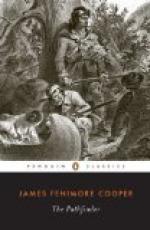“What my brother want?” asked the Indian gravely, though without taking offence at a distrust that was sufficiently plain.
“Your company, Master Arrowhead, and no more. I will go with you and speak these strangers.”
The Tuscarora assented without difficulty, and again he directed his patient and submissive little wife, who seldom turned her full rich black eye on him but to express equally her respect, her dread, and her love, to proceed to the boat. But here Magnet raised a difficulty. Although spirited, and of unusual energy under circumstances of trial, she was but woman; and the idea of being entirely deserted by her two male protectors, in the midst of a wilderness that her senses had just told her was seemingly illimitable, became so keenly painful, that she expressed a wish to accompany her uncle.
“The exercise will be a relief, dear sir, after sitting so long in the canoe,” she added, as the rich blood slowly returned to a cheek that had paled in spite of her efforts to be calm; “and there may be females with the strangers.”
“Come, then, child; it is but a cable’s length, and we shall return an hour before the sun sets.”
With this permission, the girl, whose real name was Mabel Dunham, prepared to be of the party; while the Dew-of-June, as the wife of Arrowhead was called, passively went her way towards the canoe, too much accustomed to obedience, solitude, and the gloom of the forest to feel apprehension.
The three who remained in the wind-row now picked their way around its tangled maze, and gained the margin of the woods. A few glances of the eye sufficed for Arrowhead; but old Cap deliberately set the smoke by a pocket-compass, before he trusted himself within the shadows of the trees.
“This steering by the nose, Magnet, may do well enough for an Indian, but your thoroughbred knows the virtue of the needle,” said the uncle, as he trudged at the heels of the light-stepping Tuscarora. “America would never have been discovered, take my word for it, if Columbus had been nothing but nostrils. Friend Arrowhead, didst ever see a machine like this?”
The Indian turned, cast a glance at the compass, which Cap held in a way to direct his course, and gravely answered, “A pale-face eye. The Tuscarora see in his head. The Salt-water (for so the Indian styled his companion) all eye now; no tongue.”
“He means, uncle, that we had needs be silent, perhaps he distrusts the persons we are about to meet.”
“Ay, ’tis an Indian’s fashion of going to quarters. You perceive he has examined the priming of his rifle, and it may be as well if I look to that of my own pistols.”
Without betraying alarm at these preparations, to which she had become accustomed by her long journey in the wilderness, Mabel followed with a step as elastic as that of the Indian, keeping close in the rear of her companions. For the first half mile no other caution beyond a rigid silence was observed; but as the party drew nearer to the spot where the fire was known to be, much greater care became necessary.




